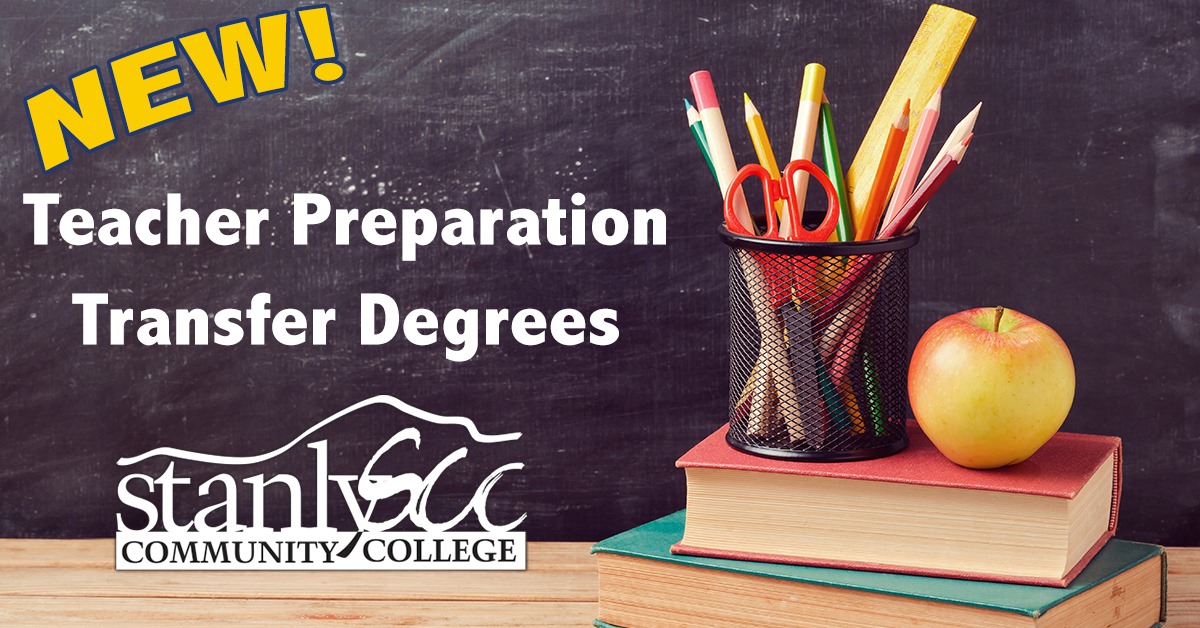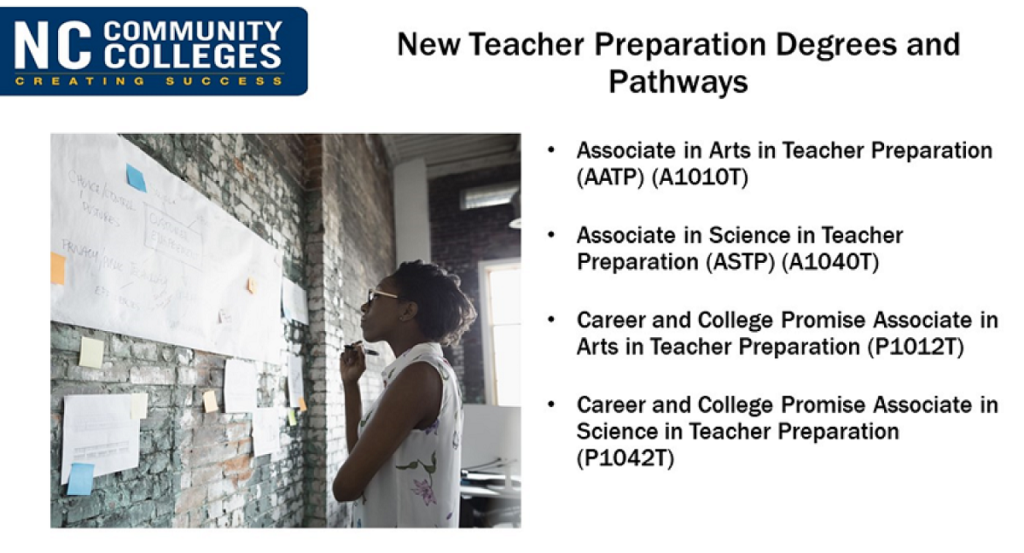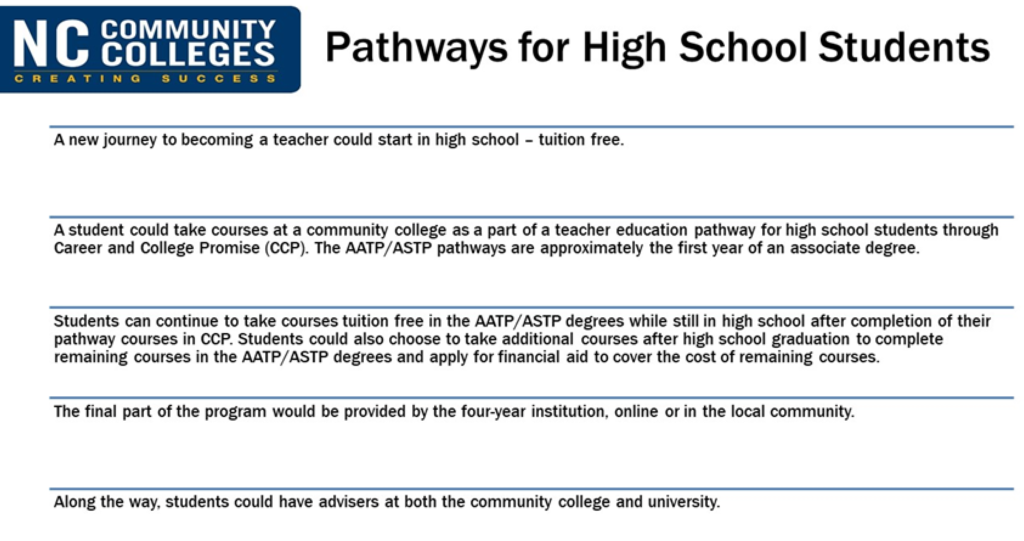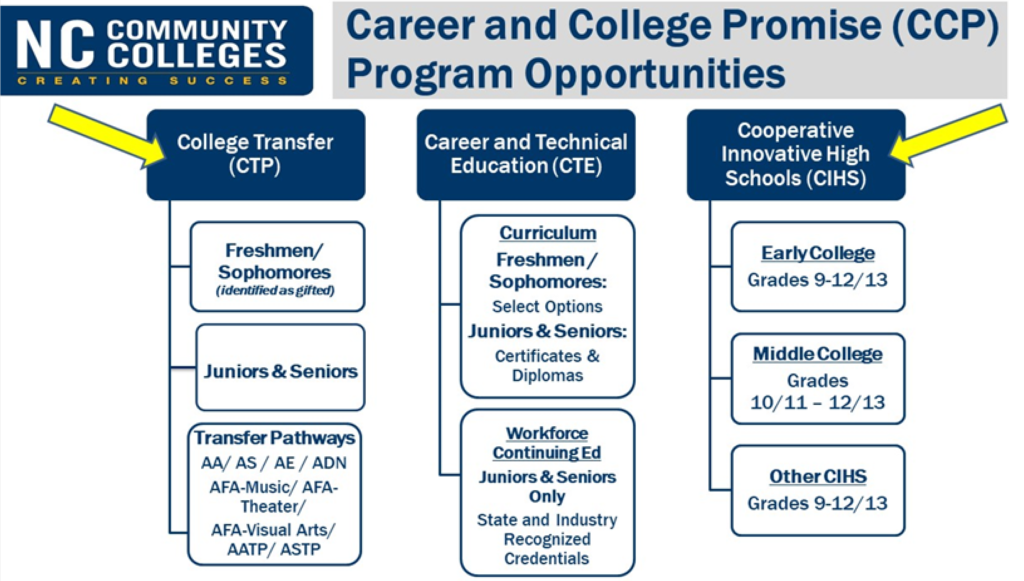
Two new associate degrees at our community colleges will make it easier for aspiring teachers to become part of North Carolina’s teacher pipeline. The state is working to increase the diversity of our teacher corps and also recruit teachers who want to serve their own communities. The new degrees were discussed last week at two different meetings of stakeholders and policymakers.
“These are the two degrees we developed to help get teachers into the teacher pipeline,” said Kim Gold, chief academic officer for the N.C. Community College System. “We began this before the COVID challenges that we are facing now, but I think this is even more important now than it was.”
Addressing the program committee of the State Board of Community Colleges on Thursday, Aug. 20, Gold said most of the courses were already offered at community colleges.
“The purpose behind designing this particular degree and denoting it teacher preparation,” she said, was that “we wanted these students to begin to identify themselves as future teachers and think of themselves as future teachers.”
Role of community colleges in preparing teachers also discussed by DRIVE Task Force
These degrees are part of a strategy that will help community colleges across North Carolina quickly address diversity in the teacher pipeline, especially in underserved areas.
“Community colleges play an important and often unheralded role in building the pipeline of educators of color,” said Anthony Graham, chair of the Developing a Representative and Inclusive Vision for Education (DRIVE) Task Force, at a virtual meeting held on Tuesday, Aug. 18.
Lisa Mabe Eads, the associate vice president of programs at the N.C. Community College System and a member of the DRIVE Task Force, gave a presentation on what the community college system is doing to improve and increase diversity in the pipeline.
“We are ready to serve,” she said, noting that the journey to becoming a teacher in North Carolina can start as early as high school.
With 58 community colleges statewide serving all 100 counties, she said community colleges have the best chance of helping rural counties “grow their own” teachers.
Eads said the student population at community colleges is more diverse than at traditional teacher preparation programs, and the lower cost of community college serves to increase access.
“Our goal is to recruit teachers from underrepresented populations,” said Eads, “and we also want to keep folks in their home communities.”
The DRIVE Task Force meeting focused on “understanding the challenges and opportunities around preparing racially and ethnically diverse educators.”
Here is Eads’ presentation:
What you need to know about the degrees
The two new associate degrees for community college students who want to be teachers were designed to provide seamless transfer opportunities to four-year institutions, said Eads.
Gold said these degrees align closely with the comprehensive articulation agreement, and she hopes in the future articulation agreements will be signed specifically for these degrees.
In the meantime, community colleges are building relationships with local four-year institutions. For instance, Caldwell Community College & Technical Institute announced in July 2020 a transfer agreement with Gardner-Webb University, called Bulldog Bound.
Both degrees — the associate in arts in teacher preparation and the association in science in teacher preparation — align with opportunities for teacher licensure.

Eads said the associate in arts in teacher preparation is for those who want to teach in the humanities or social sciences and the associate in science in teacher preparation is for those with an interest in STEM — science, technology, engineering, and math.
Each degree requires 60-61 semester hours. Both degrees include a social diversity course along with the following education courses: Teaching and Learning for All, Foundations of Education, Literacy Development and Instruction, and Teacher Licensure Preparation.
Eads said, “the practical application of coursework needs to be embedded so there will be opportunities for field observation.”
Twenty-five of the 58 community colleges are approved to offer these degrees (see the list below), and Eads anticipates that all of the colleges will eventually offer them. The system has an expedited process to approve these degrees for colleges, which takes just about two weeks.
High school opportunities for teacher preparation


Qualified high school students can begin taking courses to become a teacher through Career and College Promise (CCP), either through the college transfer program (CTP) or in cooperative innovative high schools, which are more commonly known as early colleges.
Eads said 119 early colleges in North Carolina are partnered with community colleges and 57 community colleges have a partnership with at least one early college.
“As you see, we are well-structured and positioned to provide opportunities to high schools students in this state,” said Eads. “This enhances our ability to reach high school students and future teachers … Our goal is to design this degree as an affordable option, attracting young people into the profession, with the help of scholarships and other supports.”
The system is also working to become an approved educator preparation program (EPP) for those in another field who want to become a teacher or those who have a degree in another area and want to get a license to teach.
Once this happens, from high school students to college students to adults working the field, community colleges will be positioned to get aspiring teachers into local classrooms quickly.
The following 22 of the 25 community colleges will offer AATP and ASTP degrees in the fall 2020, with the remaining 3 colleges offering them during later semesters.
Asheville-Buncombe Community College
Beaufort Community College
Bladen Community College
Blue Ridge Community College
Caldwell Community College and Technical Institute
Cape Fear Community College
Central Carolina Community College
Central Piedmont Community College
Davidson County Community College
Fayetteville Technical Community College
James Sprunt Community College
Johnston Community College
Lenoir Community College
Piedmont Community College
Robeson Community College
Richmond Community College
Sampson Community College
South Piedmont Community College
Southeastern Community College
Southwestern Community College
Stanly Community College
Surry Community College
Additionally, Vance-Granville Community College and Wayne Community College will offer the degrees in spring 2021, and College of The Albemarle will offer the degrees in fall 2021.


